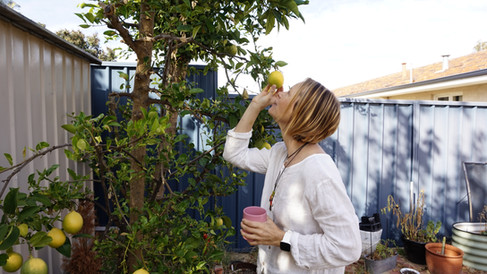Donut Waste: Circular Economy Trailblazer in WA
- Simmone Sache
- Apr 29, 2025
- 2 min read
Sharka made a name for herself by rolling up her sleeves and tackling waste head-on. After saving over 180 thousand plastic beer clips, 71 tonnes of coffee grounds and 6,500 hessian bags, she’s now focused on helping others scale their impact through strategy. As a WA-based consultant, she draws on lived experience to shape smarter systems and build stronger, more sustainable communities.
With a strong background in marketing, Sharka has always understood the power of communication to shift behaviours. Long before e-waste recycling became mainstream, she was already helping people rethink how they dispose of electronic waste.
During the COVID-19 pandemic, she launched a grassroots initiative collecting used coffee grounds, inspired by Melbourne-based social enterprise Reground. Since 2014, Reground has diverted more than 1.7 million kilograms of grounds from landfill by turning waste into local resources. Sharka brought that same spirit to WA.
“Collecting coffee grounds in Perth was tough. The distances were just too great. To make the concept more viable, I started collecting other materials too,” she said.
Sharka expanded Donut Waste, shifting focus to the reuse of hessian bags and plastic beer clips, common but often overlooked sources of packaging waste.
“In late 2024, I handed over the beer clip collection to Purple Heather. I wanted to make sure the initiative could keep going long term and create meaningful employment for people living with disabilities.”
Today, Sharka is focused on building a community-powered circular economy in WA. “I run monthly Circular Economy Meetups that bring together innovators, sustainability advocates, and business leaders looking to collaborate on local solutions. The momentum is growing.”
Globally, the circular economy is projected to grow more than 13 percent annually, with the potential to cut 22.8 billion tonnes of emissions and create 2 million jobs. In Australia, doubling circularity could add $26 billion to GDP and divert 26 million tonnes of waste.
The recently released National Circular Economy Framework (2024) shows that Australia is moving in the right direction. But to realise its full potential, we need local leaders who know how to turn policy into practice.
As climate reporting obligations take hold and sustainable practices become essential for business, circular economy consultants like Sharka are playing a vital role. With hands-on expertise and scalable solutions, they are helping to reduce waste, cut emissions, and drive real-world impact across industries and communities.









